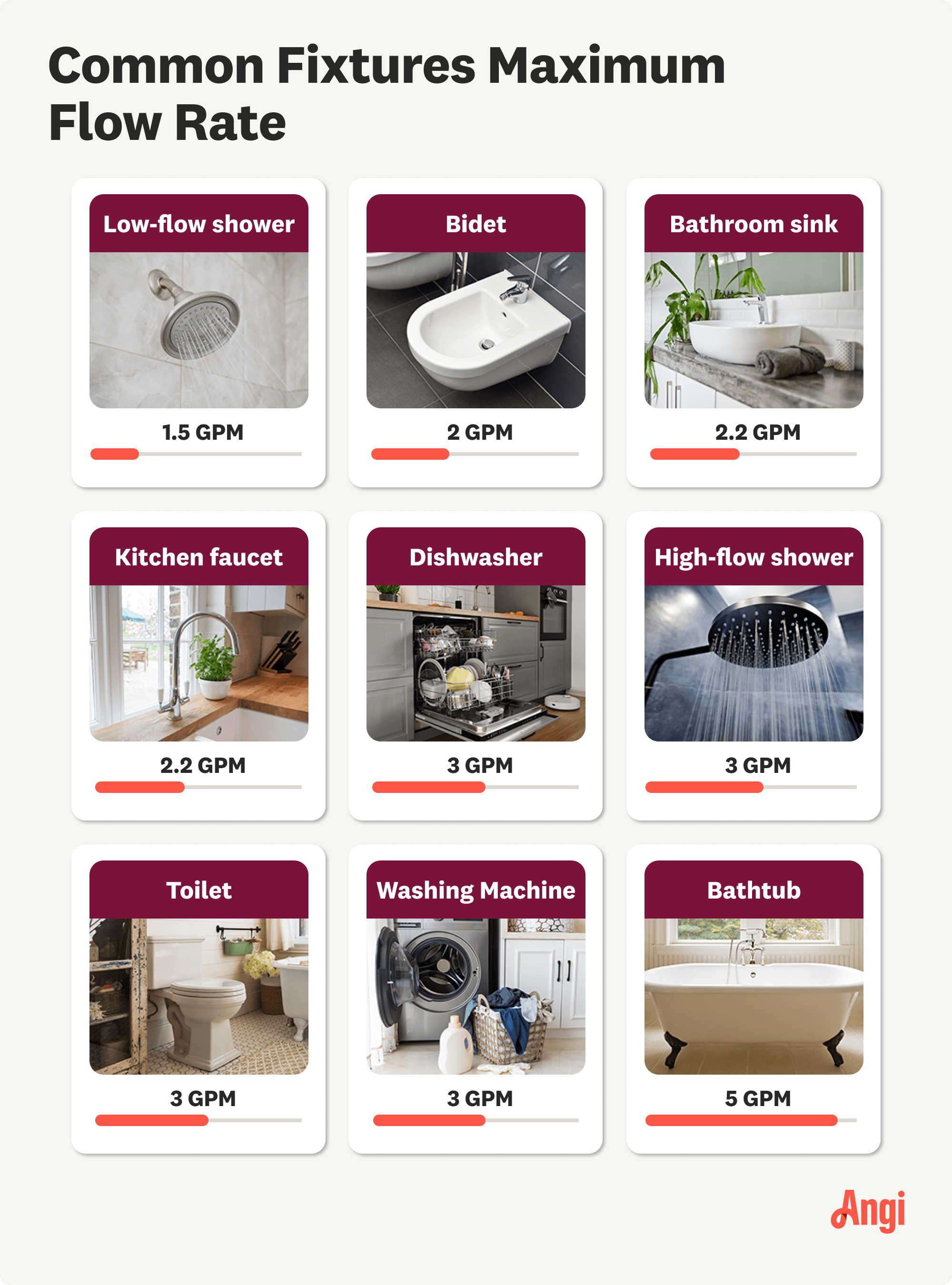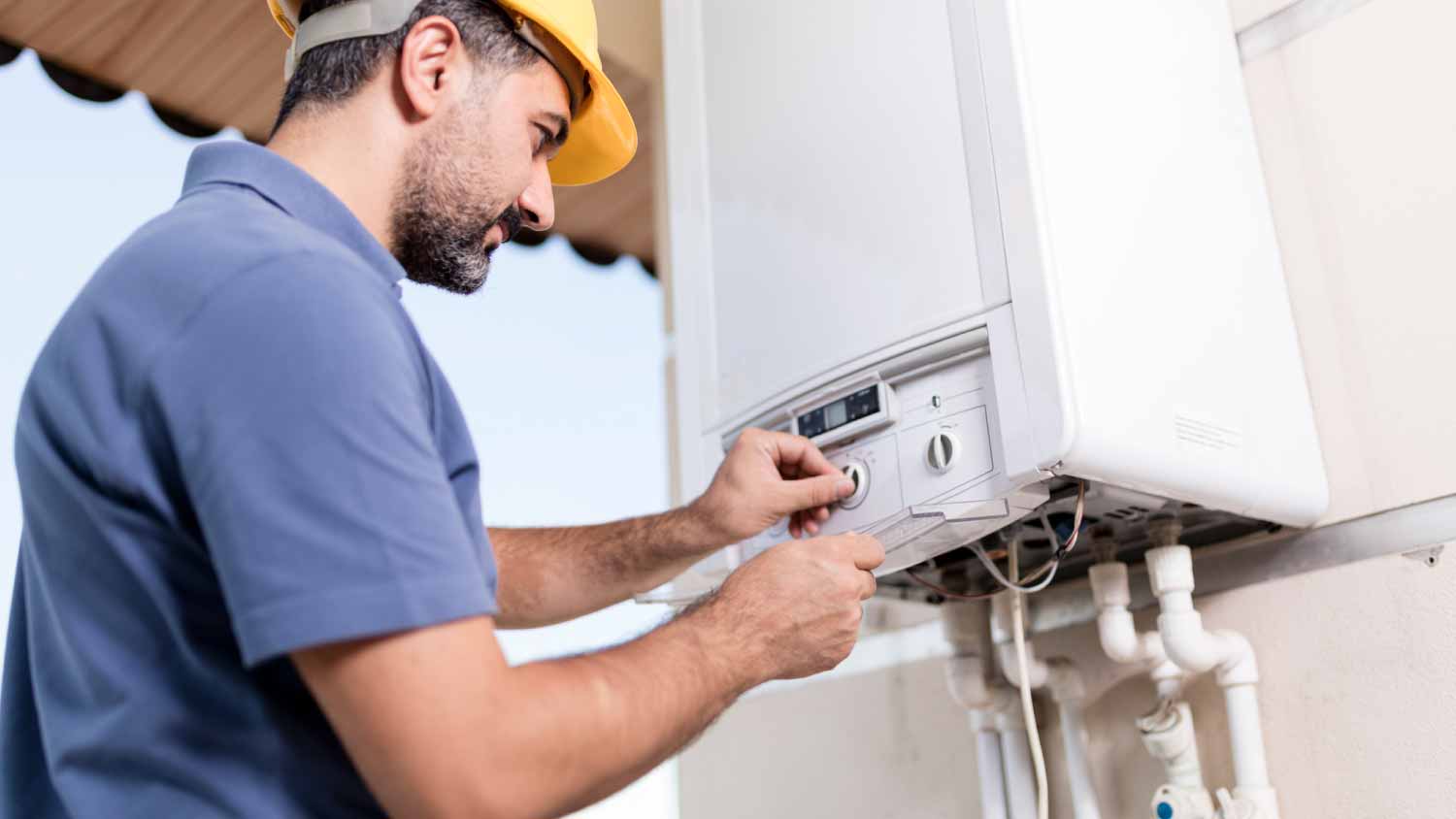What Size Water Heater Do I Need for My Home?
Line up for your water heater fitting


Water heater sizes vary from 30 gallons to over 100 gallons.
Every additional member of your household requires 10 extra gallons on average.
How much hot water your family uses during peak-hour demand is a big size factor.
Tankless water heater sizing is different from water heaters with tanks.
Sizing for tankless water heaters depends on the flow rate and groundwater temperature.
If your family is picking names for who gets the last shower because your water heater can't keep up with the number of people in your household, then it might be time to choose a different water heater size. But knowing what size water heater you need isn't always straightforward. Follow this guide to help you discover the right size for your household.
Standard Water Heater Sizes

Every household will have different water needs. However, there are some sizes you’ll see much more often than others—around 50 gallons for a tank system and around 10 gallons per minute (GPM) for tankless. There is some nuance to these numbers, as the type of heating element plays a role, as do your hookups and available space. These numbers are good starting points for homes of three to four people.
Water Heater Sizes by Type
Calculating your required heater by type is simple as long as you consume water at a typical rate. Don’t overthink it unless you run hot water to a gardening system, frequently fill up baths to clean clothes, or place other heavy demands on your water heater. The below figures are a good starting point for which size you need, regardless of water heater type.
Tank Water Heater Sizes
| Household Size | Water Heater Size |
|---|---|
| 1–2 people | 30–40 gallons |
| 2–3 people | 40–50 gallons |
| 3–4 people | 50–60 gallons |
| 4–5 people | 60–70 gallons |
| 5–6 people | 70–80 gallons |
| 6–7 people | 80–90 gallons |
| 7–8 people | 90–100 gallons |
Most homes will have a tank water heater system. To calculate the size needed, look at the members of your home. A good rule is to allocate 10 gallons for each family member, starting with a 20-gallon base size. For example, three people would be 20 gallons (base) plus 30 gallons (10 for each person) for a total base size of 50 gallons.
Tankless Water Heater Sizes
| Household Size | Water Heater Gallons per Minute (GPM) |
|---|---|
| 1-2 people | 6-8 GPM |
| 2-3 people | 7-9 GPM |
| 3-4 people | 8-10 GPM |
| 4-5 people | 9-11 GPM |
| 5-6 people | 10-12 GPM |
| 6-7 people | 11-13 GPM |
| 7-8 people | 12-14 GPM |
Tankless heaters aren’t classified by their holding capacity (since they have none) but by their gallons per minute, or GPM. Don’t be worried, though, it’s easy to determine the right size based on family members. Instead of using 20 gallons as a base, use 5 GPM. For each family member, add 1 GPM to the calculation. For example, a 5-person household would have 5 GPM (base), then an added 5 GPM (5 for each person) for a total of 10 GPM.
The water inflow temperature determines which end of the range your household will need. If you live in a southern, warm state, you can choose a tankless water heater on the lower end of the range. Homes in the north that have lower water inflow temperatures need a water heater with a higher GPM.
How to Calculate Water Heater Size

We touched on how to calculate the right size water heater above, but it may not be as simple as that. For those who want to be more precise, you’ll need to dig deeper into the details.
Both the flow rate and the incoming cold water temperature make a big difference when determining the size of tankless heaters. You need to know the maximum flow rate in GPM needed for your household and how many British Thermal Units (BTUs) your tankless water heater needs to effectively heat water on demand.
Follow these steps to calculate the right tankless water heater size for your house:
Calculate the number of fixtures you plan on using during peak-hour demand.
Find the flow rate of every fixture to calculate the total flow volume.
Look up your region’s inlet water temperature.
Subtract the inlet water temperature from the maximum hot water heater temperature for your water heater.
Compare the flow rate and temperature rise you need in a tankless water heater to the specs of any given tankless water heater to see if they meet your home's needs.
For tank heaters, you can use the simple calculator mentioned earlier:
Start with 20 gallons as the baseline.
Determine the number of full-time residents of the house.
For every resident, add 10 gallons above the baseline number.
One person is 20+10, two people result in 20+20, and so on.
Tank water heaters will hold a large amount of water at a high temperature, but what about when you drain them and they need to reheat a full tank? This is when you need to decide if you want the efficiency of gas, which heats water much faster, or the low-risk and less complicated electrical water tank heater.
Factors That Impact Hot Water Heater Size

The number of people in your household isn't the only factor for determining what size water heater you need. You also need to consider the type of water heater, the water heater’s first-hour rating, and your water consumption.
Temperature Rise
Temperature rise is the difference between the desired temperature and the temperature of the water as it enters the heater. This presents some geographic considerations, but for the most part, those who aren’t living in cold climates won’t need to consider this aspect. Those who do will need to pay attention to the ratio and how it interacts with the first-hour rating.
First-Hour Rating
The first-hour rating (FHR) is the amount of hot water your fully heated water heater can produce in an hour. This rating tells you if your water heater is efficient enough to heat your water. You can find the FHR in the manufacturer’s description of prospective water heaters.
Peak-Hour Demand
The FHR is not the only part of this equation. To determine if the FHR is adequate for your home, you then have to look at the peak-hour demand in your household. The peak hour demand is how much hot water your home uses during the peak hour of hot water consumption in a given day.
Using some simple math, go around your home and calculate how many gallons of water your home uses during the peak hour. If your home uses 50 gallons of water during your peak hour, then it's a good idea to choose a water heater with an FHR that is higher than that amount to ensure you don't run out of hot water.
What to Do If Your Hot Water Heater Is the Wrong Size
Let’s say you move into a home and the heater is, well, tiny. Or some in-laws decided their visit turned into their living situation. Either way, you’ll be wondering how to deal with a water heater that just won’t cut it.
If you are swapping water heaters for the same type—tankless for tankless or tank for tank—then your project will be much easier and less costly. No matter what your heater type, though, this isn’t really a DIY project.
For example, you would need a local plumber and an electrician to install a water heater that doesn’t retroactively fit where the old water heater was stored. Also, do you know how to monitor pressure valves and route plumbing correctly?
While some savvy DIYers may not need a professional to complete the installation, we strongly suggest that you contact a water heater contractor near you to install the correct size water heater.
Frequently Asked Questions
Going from a tank to a tankless water heater is one of the most effective ways to lower your utility bills. The switch also frees up more space and ensures a consistent hot water supply, as the water is heated on an as-needed basis. It costs between $5,400 and $7,400 to install a new tankless water heater. Most installation companies will also help dispose of your old water tank.
You can use multiple tankless water heaters, but that doesn’t mean you should. Adding multiple tankless heaters adds considerable cost to your home in both parts and installation costs. Also, you’re adding many more points of failure in the system, making plumbing issues harder to diagnose. More heaters mean more maintenance, and insurers may want a word regarding the increased risk of water damage. A single, larger unit makes more sense in most situations.
A larger heater requires a larger breaker—unless there’s one already installed. The longer answer to this question is more nuanced. Do you place demands on the heater at the same time as running other heavy-duty appliances like ovens and washing machines? Do you live in an older home that may not have considered the higher electrical demands we have now? Breakers need to be sized at 125% of the load. To find that load, you should call a local electrical pro.





- 6 Signs Of Water Heater Failure
- What to Do if Your Tankless Water Heater Freezes
- Water Heater Inspection Checklists: What You Should Know
- Is a Water Softener for a Tankless Water Heater Necessary?
- Can You Use a Tankless Water Heater in Cold Climates?
- How to Spot a Frozen Water Heater and Fix Frosted Plumbing
- Comparing Condensing vs. Non-Condensing Tankless Water Heaters
- Can You Use Water if the Water Heater Is Leaking?
- Water Heater Installation Code Requirements and Violations You Should Know
- 6 Signs Your Water Heater Might Explode










